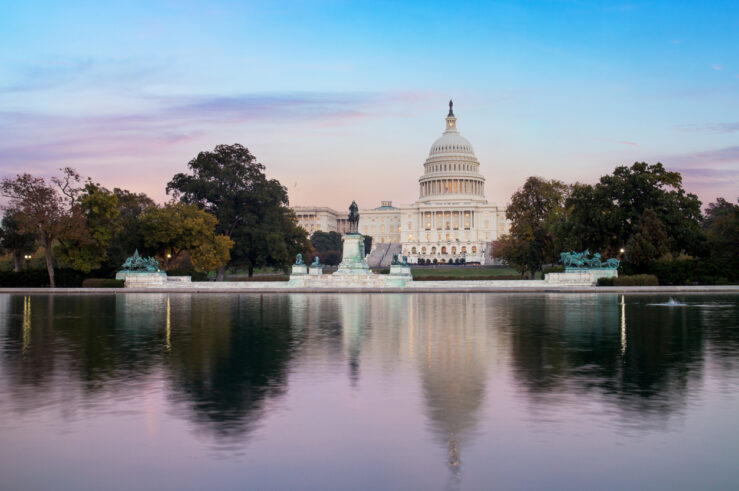Showing archive for: “Vertical Restraints & Self-Preferencing”
New Frontiers of Fairness: Auto Da Fé by the Grand Inquisitor of Economics
July 26, 10 A.F. (after fairness) Dear Fellow Inquisitors, It has been more than a decade now since the Federal Neutrality Commission, born of the ashes of the old world, ushered in the Age of Fairness. As you all know, the FNC was created during the Online Era, when the emergence of the largest companies ... New Frontiers of Fairness: Auto Da Fé by the Grand Inquisitor of Economics
The Catch-22 of AICOA’s Guidelines
If S.2992—the American Innovation and Choice Online Act or AICOA—were to become law, it would be, at the very least, an incomplete law. By design—and not for good reason, but for political expediency—AICOA is riddled with intentional uncertainty. In theory, the law’s glaring definitional deficiencies are meant to be rectified by “expert” agencies (i.e., the ... The Catch-22 of AICOA’s Guidelines
The Bitter Fruits of Federal Antitrust ‘Reform’ Legislation
Much ink has been spilled regarding the potential harm to the economy and to the rule of law that could stem from enactment of the primary federal antitrust legislative proposal, the American Innovation and Choice Online Act (AICOA) (see here). AICOA proponents, of course, would beg to differ, emphasizing the purported procompetitive benefits of limiting ... The Bitter Fruits of Federal Antitrust ‘Reform’ Legislation
Winter in Helsinki
Jouko Hiltunen gazed out the window into the midday twilight. Eight stories down, across the plaza and promenade, the Helsinki harbor was already blanketed under a dusting of snow. By Christmas, the ice would be thick enough for walking out to the castle at Suomenlinna. Jouko turned back to his computer screen. His fingers found ... Winter in Helsinki
AICOA Is Neither Urgently Needed Nor Good: A Response to Professors Scott Morton, Salop, and Dinielli
Earlier this month, Professors Fiona Scott Morton, Steve Salop, and David Dinielli penned a letter expressing their “strong support” for the proposed American Innovation and Choice Online Act (AICOA). In the letter, the professors address criticisms of AICOA and urge its approval, despite possible imperfections. “Perhaps this bill could be made better if we lived in ... AICOA Is Neither Urgently Needed Nor Good: A Response to Professors Scott Morton, Salop, and Dinielli
AICOA: An Affront to the Rule of Law
The fate of the badly misnamed American Innovation and Choice Online Act, S. 2992 (AICOA), may be decided by the August congressional recess. AICOA’s serious flaws have been ably dissected by numerous commentators (see, for example, here, here, here, and here). Moreover, respected former senior Democratic antitrust enforcers who have advocated more aggressive antitrust enforcement ... AICOA: An Affront to the Rule of Law
The Competition and Transparency in Digital Advertising Act Is Fatally Flawed
The Competition and Transparency in Digital Advertising Act (CTDAA), introduced May 19 by Sens. Mike Lee (R-Utah), Ted Cruz (R-Texas), Amy Klobuchar (D-Minn.), and Richard Blumenthal (D-Conn.), is the latest manifestation of the congressional desire to “do something” legislatively about big digital platforms. Although different in substance from the other antitrust bills introduced this Congress, ... The Competition and Transparency in Digital Advertising Act Is Fatally Flawed
How Tech Startups Could Be a Casualty of the War on Self-Preferencing
We will learn more in the coming weeks about the fate of the proposed American Innovation and Choice Online Act (AICOA), legislation sponsored by Sens. Amy Klobuchar (D-Minn.) and Chuck Grassley (R-Iowa) that would, among other things, prohibit “self-preferencing” by large digital platforms like Google, Amazon, Facebook, Apple, and Microsoft. But while the bill has ... How Tech Startups Could Be a Casualty of the War on Self-Preferencing
The ABA’s Antitrust Law Section Sounds the Alarm on Klobuchar-Grassley
Sens. Amy Klobuchar (D-Minn.) and Chuck Grassley (R-Iowa)—cosponsors of the American Innovation Online and Choice Act, which seeks to “rein in” tech companies like Apple, Google, Meta, and Amazon—contend that “everyone acknowledges the problems posed by dominant online platforms.” In their framing, it is simply an acknowledged fact that U.S. antitrust law has not kept ... The ABA’s Antitrust Law Section Sounds the Alarm on Klobuchar-Grassley
Rules Without Reason
In his July Executive Order, President Joe Biden called on the Federal Trade Commission (FTC) to consider making a series of rules under its purported authority to regulate “unfair methods of competition.”[1] Chair Lina Khan has previously voiced her support for doing so.[2] My view is that the Commission has no such rulemaking powers, and ... Rules Without Reason
Labor Antitrust Analysis Should Focus on Actual Anticompetitive Agreements
Biden administration enforcers at the U.S. Justice Department (DOJ) and the Federal Trade Commission (FTC) have prioritized labor-market monopsony issues for antitrust scrutiny (see, for example, here and here). This heightened interest comes in light of claims that labor markets are highly concentrated and are rife with largely neglected competitive problems that depress workers’ income. ... Labor Antitrust Analysis Should Focus on Actual Anticompetitive Agreements
Can the FTC Use Rulemaking to Change Antitrust Law?
FTC Rulemaking Power In 2021, President Joe Biden appointed a prolific young scholar, Lina Khan, to chair the Federal Trade Commission (FTC). Khan strongly dislikes almost every element of antitrust law. She has stated her intention to use notice and comment rulemaking to change antitrust law in many ways. She was unable to begin this process ... Can the FTC Use Rulemaking to Change Antitrust Law?















